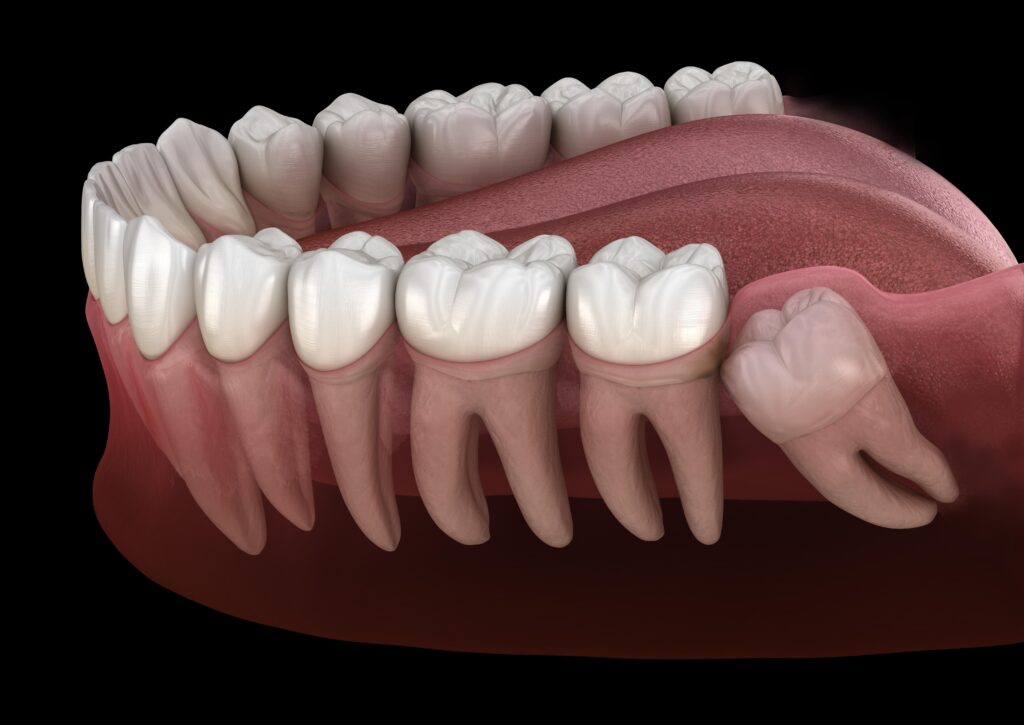Wisdom teeth often raise questions because they appear later in life and can cause discomfort, uncertainty, and oral health challenges. Many people only learn about them when pain or a dental exam reveals they are not growing as they should. These third molars generally emerge between ages 17 and 25, but the jaw has often finished developing long before that, leaving limited space for proper eruption. We will explore why these teeth are frequently impacted and why it is important to understand the risks of leaving them untreated.
Why Wisdom Teeth Become Impacted
- Limited Jaw Space and Late Arrival
Wisdom teeth commonly become impacted because they emerge long after the rest of the adult teeth have settled into place. By the time these third molars begin to push through, the jaw has already completed most of its growth, leaving little to no room for additional teeth. This lack of space can cause wisdom teeth to collide with neighboring molars or become trapped beneath the gumline. When teeth push against each other, the result can be swelling, inflammation, or even recurring infections. The pressure may also shift the alignment of surrounding teeth, disrupting the bite and requiring future dental corrections. Many individuals choose to consult the Best Dentist In Hamilton for guidance when these early signs appear. Understanding that impacted teeth often begin with something as simple as insufficient space underscores the importance of early evaluation in protecting long-term oral health.
- Abnormal Growth Angles and Root Development
Another reason wisdom teeth become impacted relates to the direction in which they grow. Unlike other teeth, wisdom teeth often emerge at angles that are not aligned with the natural jaw alignment. Some tilt toward the second molars, while others angle backward toward the jaw or even remain horizontal. When a tooth grows in the wrong direction, it becomes nearly impossible for it to break through the gumline properly. As roots develop, the tooth becomes even more firmly lodged in place, increasing discomfort and the risk of complications. An impacted tooth positioned at an unusual angle can press against nerves, causing tingling, numbness, or persistent jaw soreness. Additionally, a partially erupted wisdom tooth can create a flap of gum tissue that traps food particles, making it harder to clean and more likely for bacteria to thrive. These situations explain why abnormal growth angles significantly contribute to impaction and why timely intervention helps prevent more serious concerns in the future.
- Hidden Risks and Long-Term Oral Health Concerns
While the discomfort associated with impacted wisdom teeth is a common reason people seek treatment, the hidden risks are often far more important to understand. Impacted wisdom teeth can lead to repeated infections, cyst formation, gum disease, and decay in nearby molars. Because these teeth are difficult to reach and clean, they create an environment where bacteria can easily multiply. Cysts or benign growths may develop around the tooth, damaging the jawbone. In more advanced cases, the infection can spread deeper into the surrounding tissues, making treatment more complicated. Pressure from impacted wisdom teeth may also cause crowding or misalignment, undoing years of orthodontic progress for individuals who previously had braces. These long-term risks show why paying attention to the earliest signs of impaction is essential, even if pain is minimal at first.
- Why Paying Attention to Symptoms Truly Matters
Understanding the significance of impacted wisdom teeth means recognizing the symptoms that often accompany them. Many people believe they should wait for extreme pain before seeking dental help, but early warning signs can be subtle. These include tenderness in the gums, swelling, headaches, difficulty opening the mouth fully, or discomfort while chewing. When early signs are ignored, the situation can escalate quickly, leading to infections, facial swelling, and even difficulty maintaining regular eating habits. Impacted teeth may cause persistent inflammation, which can affect nearby tissues and contribute to gum disease. Even minor irritation can signal that a wisdom tooth is trapped and struggling to erupt. By understanding these signals and seeking timely evaluation, individuals can avoid unnecessary complications and protect the stability of surrounding teeth. Recognizing symptoms early enables more comfortable, predictable, and beneficial long-term treatment options for oral health.
Understanding why wisdom teeth become impacted is essential for protecting long-term dental health and minimizing avoidable discomfort. These third molars face challenges due to limited jaw space, unusual growth angles, and the potential to cause hidden oral health issues when they fail to erupt properly. With the right awareness and timely dental assessment, individuals can safeguard their oral well-being and prevent the wider effects that impacted wisdom teeth may have on surrounding teeth and gum tissue. This awareness empowers better decisions and promotes a healthier, more comfortable future for anyone experiencing changes related to their wisdom teeth.






